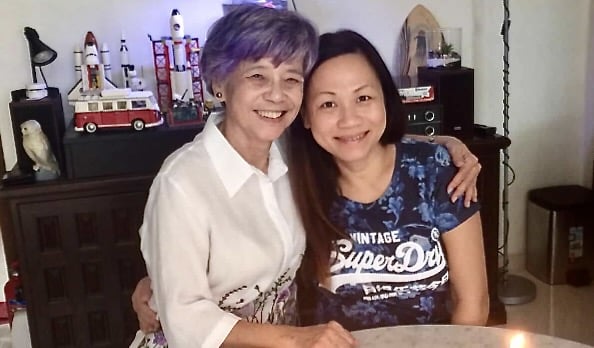“She wasn’t just my mother-in-law, she was my friend”: Salt&Light Family Night on how to love and live with our in-laws
by Christine Leow // September 1, 2022, 3:23 pm

Theresa Tan (right) and her mother-in-law became friends when Theresa was 19 and her then-boyfriend (now husband) took her home to meet his parents for the first time. Photo courtesy of Theresa Tan.
Theresa Tan was 19 when her boyfriend took her home to meet his parents. Right from the start, she and her future mother-in-law got along very well.
“My mother-in-law and I always had a great relationship. She was very quickly a friend rather than my boyfriend’s mother. She would make me very comfortable.
“We could have long conversations about flowers, TV shows and things like that. We just really got along. So, in the true sense of the word, we were really friends.”

Theresa with her parents-in-law and three children. Her parents-in-law moved in with her family seven years ago so they could care for them. Her father-in-law has since passed on. Photo courtesy of Theresa Tan.
Eight years later when Theresa and her husband got married, her friendship with her mother-in-law remained strong.
Her mother-in-law was the one who gave Theresa her first Bible. When the children came along, she was an involved grandparent, going over to their home to help watch the grandchildren while Theresa and her husband were busy at work.
That is not to say that there was no friction when her mother-in-law eventually moved in to live with Theresa’s family.
“My mother-in-law and I always had a great relationship.”
“The struggle was mostly in the kitchen because she is Peranakan. We had squabbles there: You can’t blend this. You have to chop it,” Theresa admitted honestly.
Theresa was speaking to nearly 100 Zoom participants at Salt&Light Family Night (August 30) on the topic of: How do I honour my in-laws.
A writer, editor, screenwriter and a playwright with over three decades of creative editorial experience, Theresa has lived with both her parents and her parents-in-law. She has three children aged 16 to 23.
Husband and wife Albert and Alison Lim were also on the Salt&Light Family Night panel. They are the National Directors of Family Foundations Singapore, a faith-based agency to transform families and bless generations. Married for 33 years, they have three children aged 25 to 31, two children-in-law, and a granddaughter who is two-and-a-half years old as well as another granddaughter on the way.

Albert and Alison (seated with granddaughter) with their children and children-in-law. Photo courtesy of the Lims.
Among the viewers that night, the majority (68%) did not live with their in-laws. They generally also had better relationships with their parents than their in-laws. Almost 40% of the viewers, the largest percentage, rated their relationship with their parents a 5 on a scale of 1 to 7. When it came to in-laws, the largest percentage of viewers (34%) rated their relationship at 4.
What hindered a better relationship with their in-laws were the differences – different views, different values, personality clashes and distance.
Living with parents and in-laws: Theresa Tan’s story
When Mum came to stay
In 2003, when Theresa and her husband were parents to two young children – a four-year-old son and a two-year-old daughter – her mother was diagnosed with breast cancer for the second time.
They decided against chemotherapy given her age and condition. At the same time, her father had late-stage Parkinson’s disease.
“My mum was Catholic. She would share, ‘I’m praying for you so that you will meet Jesus.'”
“I had a long talk with my husband. I really married a gift from God. He was the one who said, ‘Why don’t we move Mum in?’”
So, Theresa’s mother spent the last nine months of her life living with Theresa while her father was placed in a nursing home nearby.
While much has been said about mother-in-law and daughter-in-law relationships, men can have friction with their in-laws, too. Because of their different values, Theresa’s husband “struggled a lot” in the early years of the marriage in his relationship with Theresa’s mother.
“My Mum would say to my husband, ‘I give you angbao (red packets) so you can grow tall-tall.’ Obviously, he wasn’t going to grow any taller. My husband just took it in his stride.”
By the time Theresa’s mother went to live with her, she had “mellowed a lot”. What Theresa was grateful for was her daily prayers.
“At that point, I wasn’t a Christian yet. My mum was Catholic. She would share with me during those nine months, ‘I’m praying for you so that you will meet Jesus.’”
A month before her mother passed away, Theresa became a Christian.
Caring for in-laws
Three years after this in 2006, Theresa’s father-in-law had a minor stroke while her mother-in-law was sleeping over at Theresa’s home.
“It kind of scared everyone. It was at that point that my husband and I started talking seriously about merging the two households so we could always have someone around for Dad because he had a minor stroke which could lead to other strokes.
The last seven years have been difficult. Both Theresa’s father- and mother-in-law were diagnosed with dementia.
“Because of that, he also went into depression. So, I felt it was important to watch over him. I didn’t want anything to happen to him.
“My husband was a bit reluctant. But we felt: Let’s honour our parents, they’ve being a gift to us. So, we should really look after them, make sure they are safe, happy and healthy.”
In 2008, her parents-in-law sold their house as did Theresa. She and her husband bought a new one and her parents-in-law moved in with them.
At first, “everything was okay”. But with proximity and age came friction. Theresa’s Peranakan mother-in-law, used to having her own kitchen, clashed with her over cooking methods. Out of love, Theresa accommodated her.
“I had the kitchen fitted to her height – she is quite short – so she could cook,” said Theresa.
The last seven years have been difficult, admitted Theresa. Both her father- and her mother-in-law were diagnosed with dementia.
“In 2017, it got more intense. My father-in-law was so used to going out but he would get lost all the time. He refused to have a tracker so it was harder to locate him.”
“We can talk about God. That is one of the things she is very lucid about when we talk.”
In 2020, he passed away from pneumonia.
Her mother-in-law’s dementia has since advanced. “It has been very stressful for me and my husband, and the children.
“Grandma would come and tell them a story for the ninth time in an hour. They would be like, ‘Yes, Mama’ because we told them not to tell Mama she already told them that.”
Despite this, there are still glimpses of the woman her mother-in-law used to be. She continues to pray for the family and has gone back to cell group meetings.
“We can talk about God. That is one of the things she is very lucid about when we talk.”
Since last November, her mother-in-law has been living with her brother-in-law as Theresa had to go for a major operation. But come 2023, she will return to Theresa’s home.
Living with in-laws: The Lims’ story
Even when they were dating, Albert already made it clear to Alison that he intended to have his parents live with them after marriage.
“I’m so glad and thank God that she open-heartedly agreed to it. I guess it was a bit of my charm lah to get her to agree,” joked Albert.
When Alison first brought him home, her parents welcomed Albert with kindness and generosity.
Alison countered with a smile: “It was a very practical reason. Both of us were really tied up in our careers at that point in time. If my in-laws are here to look after my children, it makes a lot of sense.”
Having come from a huge extended family, Alison never worried that she would not be able to cope with living with her in-laws. What gave her pause was Albert’s remark that his parents would be living with them “as long as they live on earth”.
“At first, I was a bit shocked. But later, I thought: That’s really very sweet because we don’t see them as a transactional relationship but really both accept each other and it was going to be a long-term affair.”
On the part of Albert, getting along with his in-laws was not an issue. When Alison first brought him home to meet her parents, they welcomed Albert with kindness and generosity.
“I was pleasantly surprised,” said Albert.
His mother-in-law, in particular, “fed me with good food” and treated him very well, continuing to do so even till today.
When his own parents passed away, Albert told Alison: “Now, I have just your parents.”
To honour her, when Albert asked for Alison’s hand in marriage, he acceded to his mother-in-law’s request to observe the Chinese tradition of guo da li even though he did not subscribe to the same beliefs.
The betrothal ceremony involves the groom-to-be presenting money and gifts to the future bride’s family as a token of gratitude for raising his wife. When the family accepts the gifts, it is a sign that they accept the groom.
Said Albert: “There was a clarity in my heart that what I was doing was not idolatry. I thank God that I could respect my parents-in-law.”
In fact, he is so close to them that when his own parents passed away, Albert told Alison: “Now, I have just your parents.”
Said Alison: “I conveyed that to my mum and my mum was very touched. She cooked some more for him!”
How can we honour our in-laws like our parents?
Participants had these tips to share from their own experience:
1. Relate to them according to their interests
Said Albert about how he relates to his mother-in-law: “When I eat her food, I make sure to comment that it is very nice.
“It’s not flattery. I’m being authentic about it because I feel her food is nice and I enjoy it.
“Her love language is to feed you. I try to acknowledge that.”
With his father-in-law who is a businessman, they talk about the business industry.
2. Be present for them
Just because they are older, they are not redundant. They should know that, said Alison.
“Don’t cut them short when they speak. Have patience. When you visit them, let them talk to you. It is like saying, ‘I value you.’ Bring your presence to them.
“I always tell my kids and my husband, ‘God is so clever. He says that love is patient.’ It is so tough, though.”
“When you visit, let them talk to you. It is like saying, ‘I value you.’ Bring your presence to them.”
While growing their young family, the Lims made sure to carve out time for their parents.
“Our kids knew that Saturday is for going to see Ah Ma and Sunday is to see Mama.”
Albert also included his parents in family outings and made sure to chauffeur his mother around when his father passed away.
For Theresa, engaging her mother-in-law in conversation is how she shows she is present for her.
“I’ll ask my mother-in-law, ‘I want to make this diaper cake. How do you do it?’ We can sit there for an hour and talk about how to construct a diaper cake. When we talk about it, she brightens up.”
3. Celebrate them
Birthdays and anniversaries were never big in Theresa’s husband’s family. But when she got married, she “made a big fuss about birthdays and anniversaries”.
“My mother-in-law was very happy because for many years, these were non-events. I remember one time, she said, ‘Thank God for you because I get to celebrate.’”
4. Serve them
Pray for opportunities to serve them, said Theresa.
“Unseen barriers come down when you pray,” she added.
“Unseen barriers come down when you pray.”
She shared how she has seen cases where mothers- and daughters-in-law are brought together because the daughter-in-law accompanied her mother-in-law to a medical check-up for a “woman issue”.
“The door opened for the daughter-in-law to reach out. We are the salt and light. So, we have to be the Christian here. And it is said with actions.”
If the parents-in-law are believers but do not behave like Christians, then there is even more reason to demonstrate Christ-like love to them, added Theresa.
“We have the Holy Spirit with us. That is the best gift any daughter-in law, son-in-law, could have because we have that extra strength that comes from above to help us.”
Alison agreed. Of the care she gave to her mother-in-law when she was ill with cancer, she said: “We wanted to let mum-in-law know what Christian love is because she did not know the Lord yet.”
How can we be good caregivers to our in-laws?
1. Take care of yourself first
Having had experience caring for both sets of parents who had ailments, Theresa knows the importance of self-care.
“You need to be strong first. You can’t give to anybody anything you don’t have.”
“If you feel overwhelmed, you need to be strong first. You can’t give to anybody anything you don’t have. Care for yourself.
Make sure you are mentally, emotionally, spiritually in a good zone before taking on your in-laws.
“The mindset to have is: You can do all things through Christ who strengthens you. If God tells you it is time to bring your in-laws in, He will give you the strength and the grace to do it.
“Yes, there will be tough times, I can attest to it. But He will give you the grace through it.”
2. Communicate as a couple
“That is very, very important,” said Theresa.
It was only after discussing the matter with her husband that they took her parents in to live with them.
“If I had just put my foot down, ‘No, I want my mum to move in’, it would have been a very different kind of situation.”
3. Get help
There was a day last year when Theresa was so overwhelmed by the responsibility of caring for her mother-in-law who has dementia that she felt she could not carry on anymore.
“I was just so angry with her and yet so frustrated because I knew she didn’t mean (to be difficult).”
“Having someone not related to my mother-in-law to talk to helped.”
She had tried taking a walk and keeping a journal. She had even come to a point when she “couldn’t hear from God anymore” because she was so burdened by the unpredictability of her mother-in-law.
“I didn’t know what she would do next.”
In desperation, she went on the Internet to search for help and chanced on the Dementia Singapore website. She emailed them for help and within a day, they wrote back. Within a week, a counsellor visited her.
“Sitting there, having him listen to this conflict – I wanted to be a good daughter-in-law but I was so angry – having someone not related to my mother-in-law to talk to that I can be 100% honest with, helped,” said Theresa.
For Alison, having her sister-in-law with her when she accompanied her mother-in-law to chemotherapy sessions was helpful.
4. Explore other care options
Professional help can alleviate caregiver stress. Theresa advocated nursing homes if the parents or in-laws require care that goes beyond what the children can provide.
5. Find support
“Stay close to your cell group, stay close to your pastor. That’s the privilege that we Christians have,” said Alison.
6. Reset your thoughts
Added Alison: “Ultimately, this is the race that God has allowed me to run. So, I’m going to run it the best I can.
“Instead of thinking: Why is it so tough? Why is my life so hard? ask: How can I glorify God? How can I experience the joy of the Lord so I can be strong?
“That kind of thinking can help in the long-run.”
7. Appreciate the supporting spouse
“Having your husband appreciate you for what you have done for your mother-in-law is very important,” said Alison.
“Albert would thank me for being with my mother-in-law. That gave me extra support.”
The care she gave to her mother-in-law did not go unnoticed in other ways.
When her mother-in-law was on her deathbed, she remarked that Alison was “a very good daughter-in-law”.
This report is Part 1 of the Salt&Light Family Night episode: How can I honour my in-laws? Look out for Part 2 of the report soon.
A full recording of this episode will be available at the end of next week. You can watch past episodes of Salt&Light Family Night on our YouTube channel here.
RELATED STORIES:
“No point being a hero outside and a zero at home”: Fatherhood champion Jason Wong
With 1 in 4 married people in Singapore thinking of divorce, what hope is there for marriage?
We are an independent, non-profit organisation that relies on the generosity of our readers, such as yourself, to continue serving the kingdom. Every dollar donated goes directly back into our editorial coverage.
Would you consider partnering with us in our kingdom work by supporting us financially, either as a one-off donation, or a recurring pledge?
Support Salt&Light


